Residents have begun killing and eating dogs early in celebration of the summer solstice in a bid to avoid protests by animal rights campaigners.
Some residents of the southern Chinese city of Yulin started gathering last weekend and eating dog meat and lychees to celebrate the longest day of the year, ahead of Saturday’s actual solstice, state media reported.
The locals wanted to avoid protests which have in recent years seen the festival, slaughterhouses and markets selling dogs targeted as part of a social media campaign and ongoing online petition against the practice.
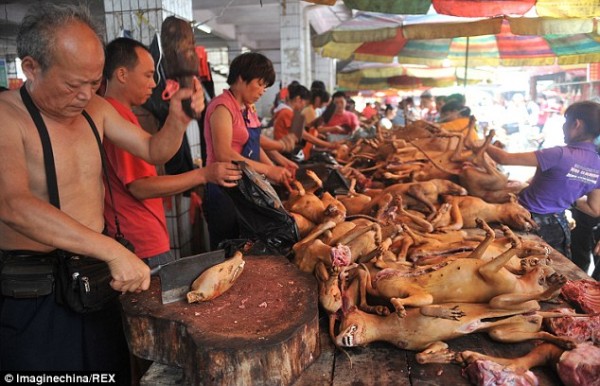
Controversial: The dog meat festival in Yulin, China, often attracts protests from animal rights activists
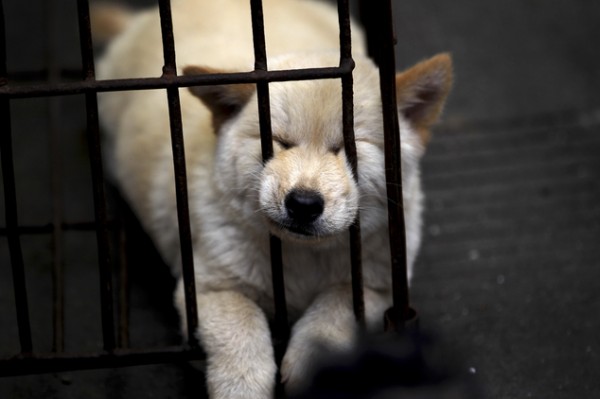
Protests: The Human Society International released this image of a dog waiting to be sold for meat in a market in Yulin in 2013
The public uproar reflects the increasing affluence of ordinary Chinese, who keep pets, travel overseas and are changing attitudes toward traditions they may not have questioned before.
Photos on state media showed groups of Yulin city residents tucking into plates of meat and vegetables around dining tables strewn with lychees. Other photos, which circulated widely on Chinese microblogs, were of skinned, cooked dogs hanging from hooks at street stalls or piled on tables.
Under the Yulin tradition, eating dog and lychee and drinking liquor on the solstice is supposed to make people stay healthy during winter. It is unclear if the supposed health benefits diminish if the feast occurs before the actual solstice.
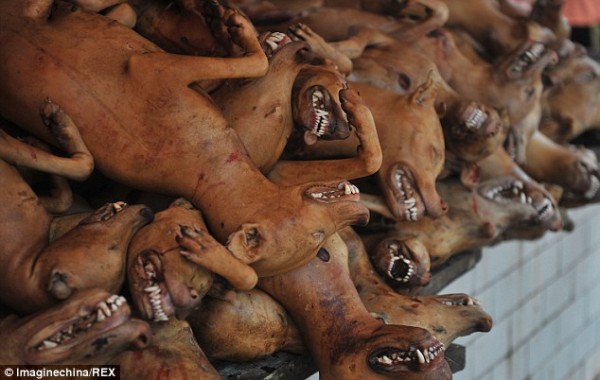
Celebration: The dogs are killed and sold as part of the summer solstice, which takes place this Saturday
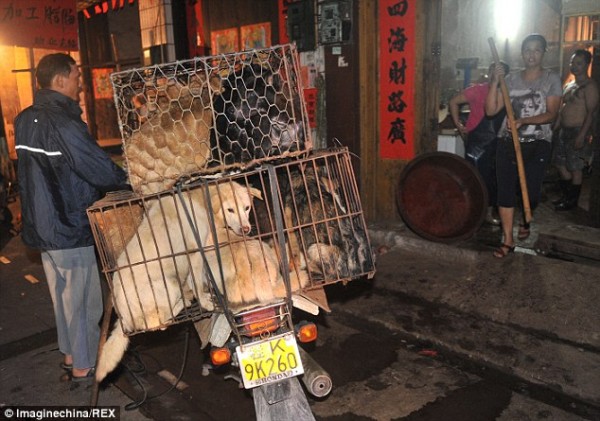
Grisly end: There are reports that local Chinese residents began their celebrations early to avoid protests
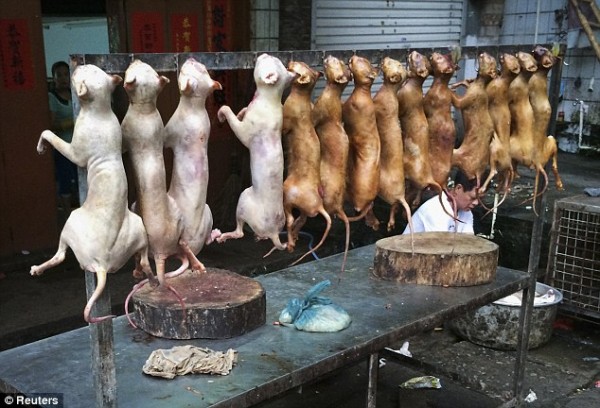
Unpopular: The Yulin government has sought to distance itself from the feasting, saying it is not officially endorsed
Animal rights activists say the event is a public health risk because the dogs undergo no quarantine to ensure they are free of disease, and that they are strays grabbed off streets around the country, as well as allegedly stolen from pet owners. The dogs are often poisoned with toxic chemicals that could be harmful to humans, they say.
Deng Yidan, an activist with Animals Asia, said the public backlash hurts the image of Yulin and China.
‘Negative coverage is growing — dog theft, criminal activities, food hygiene issues, and rabies fears — not to mention the division in society between those for and against the festival — together these have brought significantly more negative publicity to Yulin than economic benefits,’ Deng said in a statement.
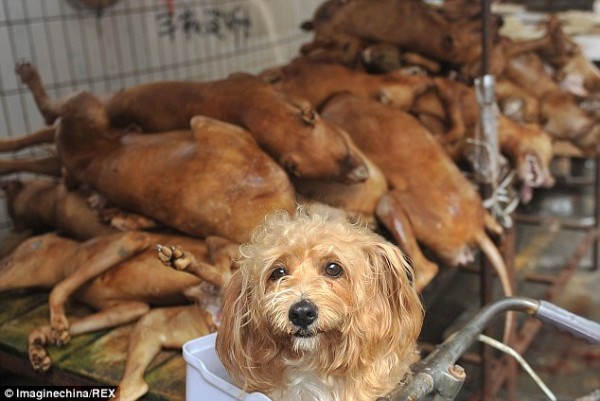
Criminal reports: Activists claim that the dogs killed are strays grabbed off streets around the country – and some are allegedly stolen from pet owners
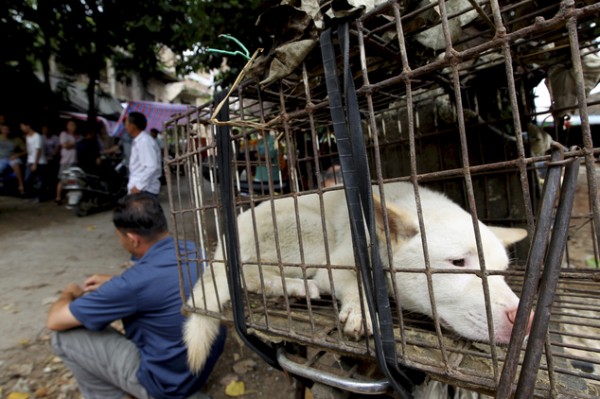
Bitter end: A dog waits to be sold for its meat in a market in Yulin
The Yulin government has sought to distance itself from the feasting, saying it is not officially endorsed. State media reports say the government told restaurants to remove references to dog meat from their menus and signboards — though it did not ban the sale and consumption of the meat, which is not illegal in China.
The government has denied the formal existence of such a festival, saying it is a culinary habit practiced only by some businesses and people.
Public pressure stopped another dog meat festival, in eastern Zhejiang province, which was cancelled in 2011 despite dating back hundreds of years.


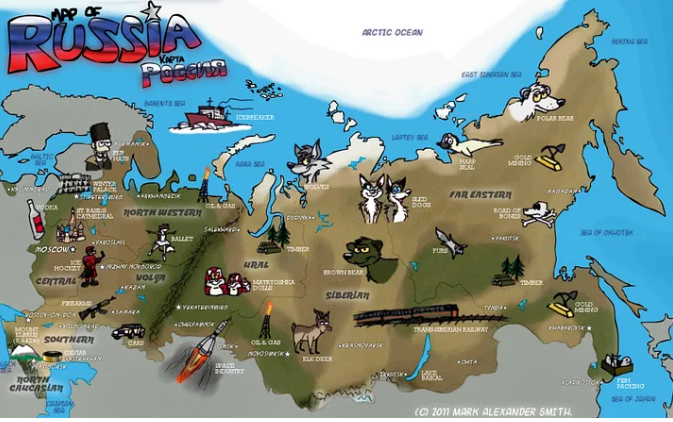





 Photographer Finds Locations Of 1960s Postcards To See How They Look Today, And The Difference Is Unbelievable
Photographer Finds Locations Of 1960s Postcards To See How They Look Today, And The Difference Is Unbelievable  Hij zet 3 IKEA kastjes tegen elkaar aan en maakt dit voor zijn vrouw…Wat een gaaf resultaat!!
Hij zet 3 IKEA kastjes tegen elkaar aan en maakt dit voor zijn vrouw…Wat een gaaf resultaat!!  Scientists Discover 512-Year-Old Shark, Which Would Be The Oldest Living Vertebrate On The Planet
Scientists Discover 512-Year-Old Shark, Which Would Be The Oldest Living Vertebrate On The Planet  Hus til salg er kun 22 kvadratmeter – men vent til du ser det indvendigt
Hus til salg er kun 22 kvadratmeter – men vent til du ser det indvendigt  Superknepet – så blir snuskiga ugnsformen som ny igen!
Superknepet – så blir snuskiga ugnsformen som ny igen!  Meteorite That Recently Fell in Somalia Turns Out to Contain Two Minerals Never Before Seen on Earth
Meteorite That Recently Fell in Somalia Turns Out to Contain Two Minerals Never Before Seen on Earth  Nearly Frozen Waves Captured On Camera By Nantucket Photographer
Nearly Frozen Waves Captured On Camera By Nantucket Photographer  It’s Official: Astronomers Have Discovered another Earth
It’s Official: Astronomers Have Discovered another Earth 
iljitf
0modho
66ylkq
15v8ce
pgu690
72u51o
590×52